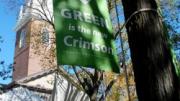“We need to substitute renewable energy for carbon-based energy. It is just that simple,” former vice president Al Gore ’69, LL.D. ’94, told a packed Tercentenary Theatre audience of nearly 10,000 Harvard students, faculty, and staff celebrating the University's commitment to reducing its greenhouse-gas emissions 30 percent from 2006 levels by 2016 (see “Environmental Action”). Gore, who has won a Nobel Prize and an Academy Award for his efforts to fight global climate change, was in Cambridge to receive the Robert Coles “Call to Service Award” from the Phillips Brooks House Association. His speech (audio) capped a week of events emphasizing environmental stewardship, ranging from sustainable meals to seminars and lectures on topics including recycling and energy conservation. Noting that the United States imports $700 billion worth of foreign oil each year, and that “continued access to the largest single source of proven oil reserves in the world” was one of many reasons for the miscalculation in entering the war in Iraq, Gore argued that "the economic crisis, the financial crisis, the debt crisis, and the climate crisis all have the same thread running through them: overdependence on carbon-based fuels. When you pull that thread,” he said, “all of these crises begin to unravel and you hold in your hand the solution....We need to put a price on carbon, we need a global treaty, and we need American leadership."
Noting that "there have been many changes in the past century that have weakened the importance of reason and facts and knowledge in our public decision-making processes,” Gore said that the role of the university in our civilization's effort to solve an existential crisis is worthy of some attention. “How do we incorporate new knowledge into our understandings of who we are and what we must do?” he asked.
Harvard President Drew Faust touched on the same theme, saying, "Harvard must be a model, as we demonstrate our commitment to the future, as we affirm our belief that the discoveries of science can enable us to change the world, and as we unite the knowledge and the passion of this community in service of broad and essential goals....There are many things we can do at the institutional level to reduce our environmental impacts. And we must recognize that our practices have pedagogical value,” she added. “We teach with what we do, as well as with what we write or what we say: how we light our classrooms; how we heat our water; how we build and ventilate our laboratories.”
While Faust's remarks (text | audio) were directed to the University community, which is now charged with meeting the Greenhouse Gas Task Force's ambitious goals, Gore addressed a wider audience: “One of the solutions to the climate crisis involves making a generational commitment to a one-off, massive investment...in a new energy infrastructure that is not free, but that is based on fuels that are free forever: the sun and the wind and the natural heat of the earth. We can make that transformation. We can see the United States of America reclaim its rightful role as moral leader of this world. We can do it sooner than people think. It is possible. We can, with American leadership, galvanize a global commitment to solve the climate crisis. We must do it with this generation. We have everything we need, with the possible exception of political will—but political will,” he said, “is a renewable resource.”









